SMART Goals Template for Transition to Professional Practice Learning Plan
VerifiedAdded on 2023/06/10
|5
|1049
|65
AI Summary
This SMART Goals Template is designed for the Transition to Professional Practice Learning Plan of Desklib. It includes achievable, relevant, identified, measurable, and time-bound objectives to improve knowledge and skills gap, cultural awareness, and self-assessment.
Contribute Materials
Your contribution can guide someone’s learning journey. Share your
documents today.
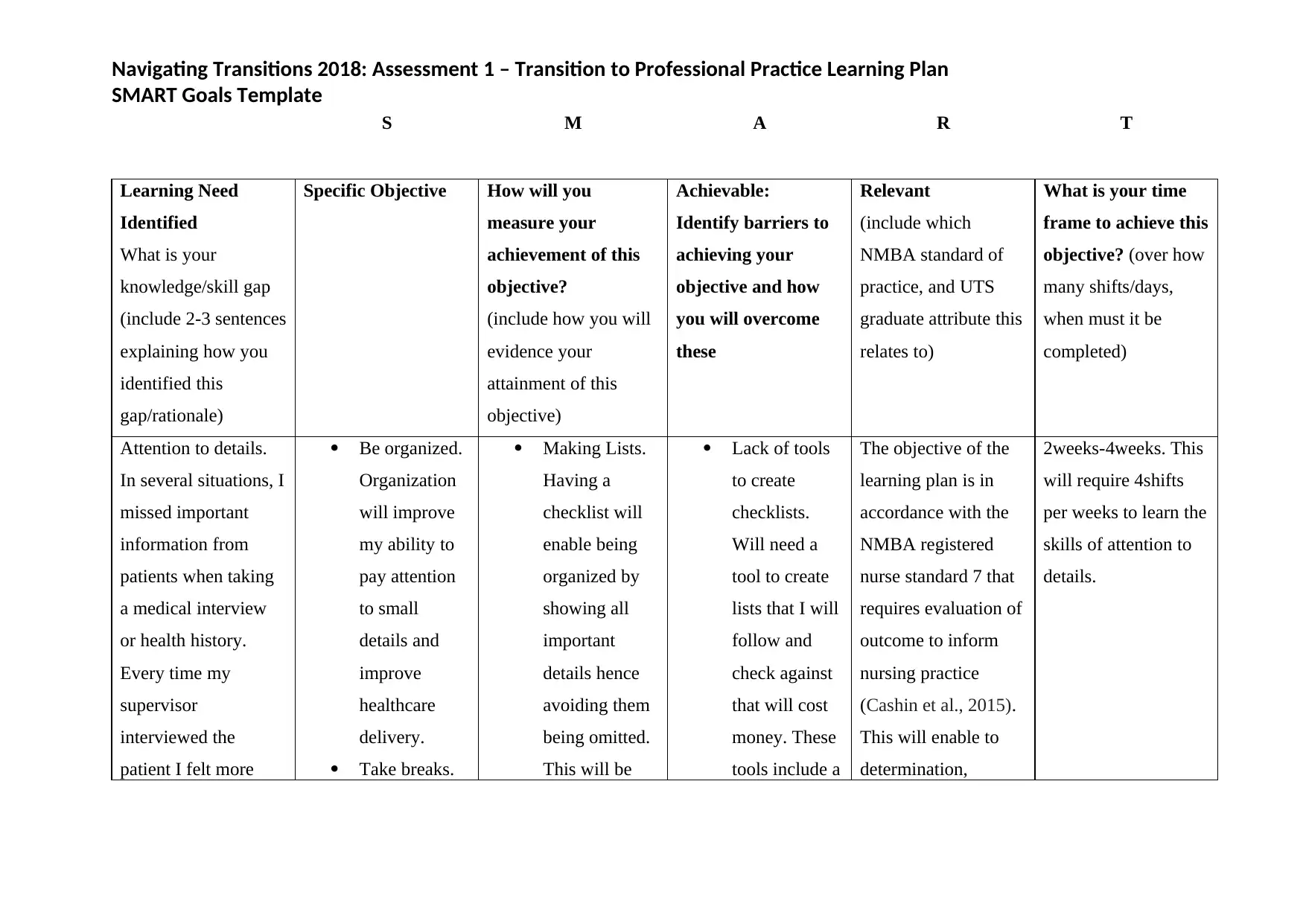
Navigating Transitions 2018: Assessment 1 – Transition to Professional Practice Learning Plan
SMART Goals Template
S M A R T
Learning Need
Identified
What is your
knowledge/skill gap
(include 2-3 sentences
explaining how you
identified this
gap/rationale)
Specific Objective How will you
measure your
achievement of this
objective?
(include how you will
evidence your
attainment of this
objective)
Achievable:
Identify barriers to
achieving your
objective and how
you will overcome
these
Relevant
(include which
NMBA standard of
practice, and UTS
graduate attribute this
relates to)
What is your time
frame to achieve this
objective? (over how
many shifts/days,
when must it be
completed)
Attention to details.
In several situations, I
missed important
information from
patients when taking
a medical interview
or health history.
Every time my
supervisor
interviewed the
patient I felt more
Be organized.
Organization
will improve
my ability to
pay attention
to small
details and
improve
healthcare
delivery.
Take breaks.
Making Lists.
Having a
checklist will
enable being
organized by
showing all
important
details hence
avoiding them
being omitted.
This will be
Lack of tools
to create
checklists.
Will need a
tool to create
lists that I will
follow and
check against
that will cost
money. These
tools include a
The objective of the
learning plan is in
accordance with the
NMBA registered
nurse standard 7 that
requires evaluation of
outcome to inform
nursing practice
(Cashin et al., 2015).
This will enable to
determination,
2weeks-4weeks. This
will require 4shifts
per weeks to learn the
skills of attention to
details.
SMART Goals Template
S M A R T
Learning Need
Identified
What is your
knowledge/skill gap
(include 2-3 sentences
explaining how you
identified this
gap/rationale)
Specific Objective How will you
measure your
achievement of this
objective?
(include how you will
evidence your
attainment of this
objective)
Achievable:
Identify barriers to
achieving your
objective and how
you will overcome
these
Relevant
(include which
NMBA standard of
practice, and UTS
graduate attribute this
relates to)
What is your time
frame to achieve this
objective? (over how
many shifts/days,
when must it be
completed)
Attention to details.
In several situations, I
missed important
information from
patients when taking
a medical interview
or health history.
Every time my
supervisor
interviewed the
patient I felt more
Be organized.
Organization
will improve
my ability to
pay attention
to small
details and
improve
healthcare
delivery.
Take breaks.
Making Lists.
Having a
checklist will
enable being
organized by
showing all
important
details hence
avoiding them
being omitted.
This will be
Lack of tools
to create
checklists.
Will need a
tool to create
lists that I will
follow and
check against
that will cost
money. These
tools include a
The objective of the
learning plan is in
accordance with the
NMBA registered
nurse standard 7 that
requires evaluation of
outcome to inform
nursing practice
(Cashin et al., 2015).
This will enable to
determination,
2weeks-4weeks. This
will require 4shifts
per weeks to learn the
skills of attention to
details.
Secure Best Marks with AI Grader
Need help grading? Try our AI Grader for instant feedback on your assignments.
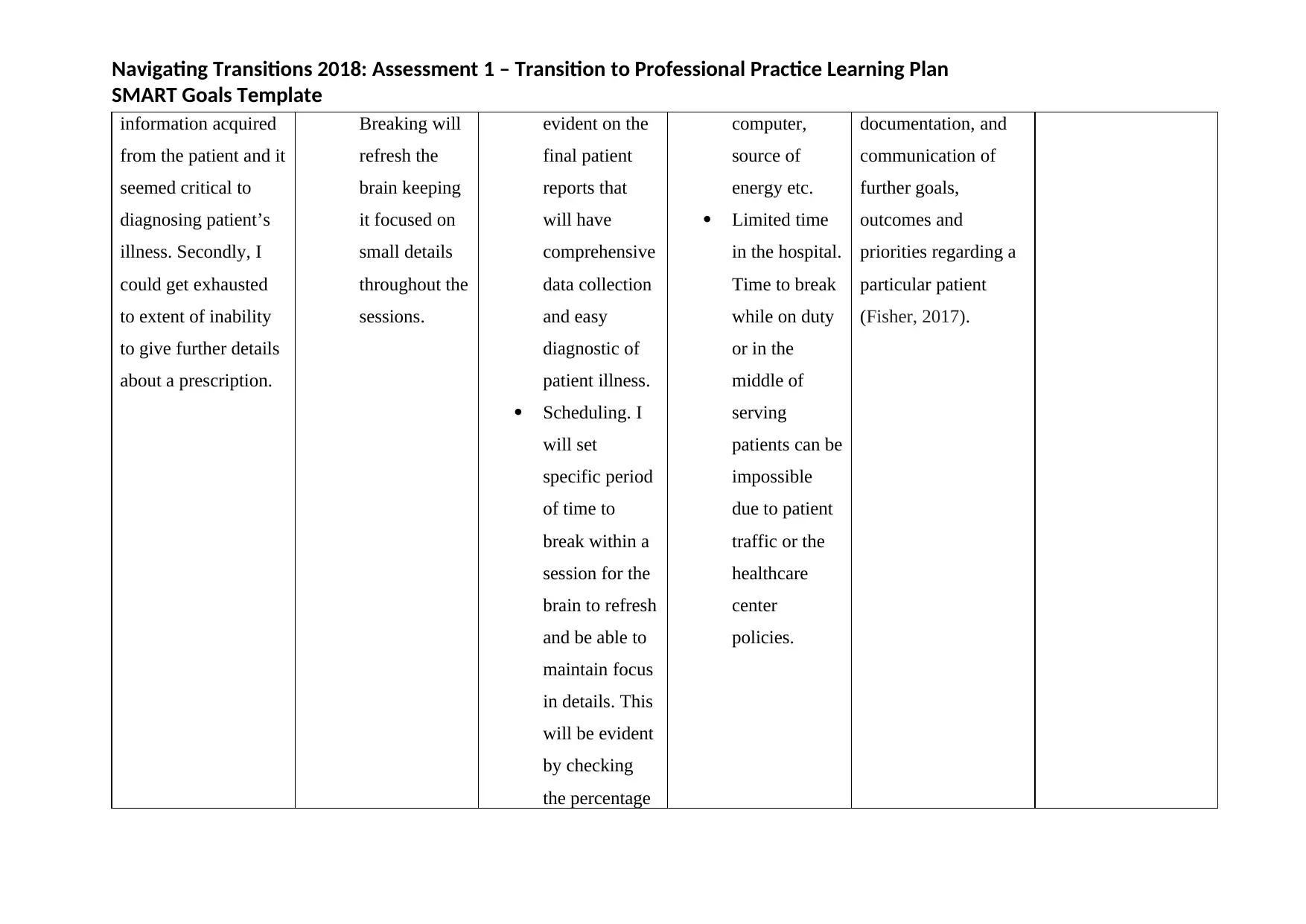
Navigating Transitions 2018: Assessment 1 – Transition to Professional Practice Learning Plan
SMART Goals Template
information acquired
from the patient and it
seemed critical to
diagnosing patient’s
illness. Secondly, I
could get exhausted
to extent of inability
to give further details
about a prescription.
Breaking will
refresh the
brain keeping
it focused on
small details
throughout the
sessions.
evident on the
final patient
reports that
will have
comprehensive
data collection
and easy
diagnostic of
patient illness.
Scheduling. I
will set
specific period
of time to
break within a
session for the
brain to refresh
and be able to
maintain focus
in details. This
will be evident
by checking
the percentage
computer,
source of
energy etc.
Limited time
in the hospital.
Time to break
while on duty
or in the
middle of
serving
patients can be
impossible
due to patient
traffic or the
healthcare
center
policies.
documentation, and
communication of
further goals,
outcomes and
priorities regarding a
particular patient
(Fisher, 2017).
SMART Goals Template
information acquired
from the patient and it
seemed critical to
diagnosing patient’s
illness. Secondly, I
could get exhausted
to extent of inability
to give further details
about a prescription.
Breaking will
refresh the
brain keeping
it focused on
small details
throughout the
sessions.
evident on the
final patient
reports that
will have
comprehensive
data collection
and easy
diagnostic of
patient illness.
Scheduling. I
will set
specific period
of time to
break within a
session for the
brain to refresh
and be able to
maintain focus
in details. This
will be evident
by checking
the percentage
computer,
source of
energy etc.
Limited time
in the hospital.
Time to break
while on duty
or in the
middle of
serving
patients can be
impossible
due to patient
traffic or the
healthcare
center
policies.
documentation, and
communication of
further goals,
outcomes and
priorities regarding a
particular patient
(Fisher, 2017).
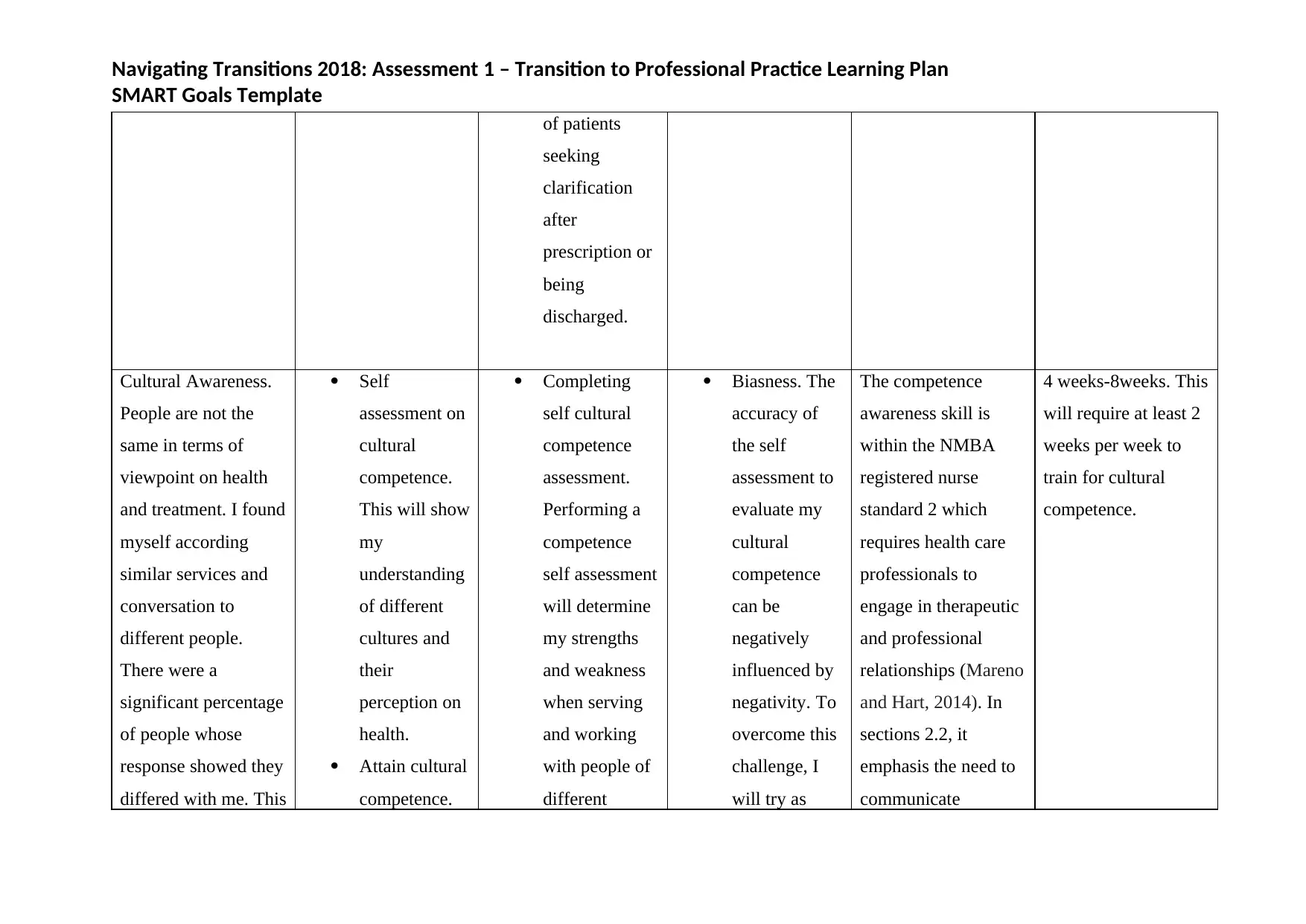
Navigating Transitions 2018: Assessment 1 – Transition to Professional Practice Learning Plan
SMART Goals Template
of patients
seeking
clarification
after
prescription or
being
discharged.
Cultural Awareness.
People are not the
same in terms of
viewpoint on health
and treatment. I found
myself according
similar services and
conversation to
different people.
There were a
significant percentage
of people whose
response showed they
differed with me. This
Self
assessment on
cultural
competence.
This will show
my
understanding
of different
cultures and
their
perception on
health.
Attain cultural
competence.
Completing
self cultural
competence
assessment.
Performing a
competence
self assessment
will determine
my strengths
and weakness
when serving
and working
with people of
different
Biasness. The
accuracy of
the self
assessment to
evaluate my
cultural
competence
can be
negatively
influenced by
negativity. To
overcome this
challenge, I
will try as
The competence
awareness skill is
within the NMBA
registered nurse
standard 2 which
requires health care
professionals to
engage in therapeutic
and professional
relationships (Mareno
and Hart, 2014). In
sections 2.2, it
emphasis the need to
communicate
4 weeks-8weeks. This
will require at least 2
weeks per week to
train for cultural
competence.
SMART Goals Template
of patients
seeking
clarification
after
prescription or
being
discharged.
Cultural Awareness.
People are not the
same in terms of
viewpoint on health
and treatment. I found
myself according
similar services and
conversation to
different people.
There were a
significant percentage
of people whose
response showed they
differed with me. This
Self
assessment on
cultural
competence.
This will show
my
understanding
of different
cultures and
their
perception on
health.
Attain cultural
competence.
Completing
self cultural
competence
assessment.
Performing a
competence
self assessment
will determine
my strengths
and weakness
when serving
and working
with people of
different
Biasness. The
accuracy of
the self
assessment to
evaluate my
cultural
competence
can be
negatively
influenced by
negativity. To
overcome this
challenge, I
will try as
The competence
awareness skill is
within the NMBA
registered nurse
standard 2 which
requires health care
professionals to
engage in therapeutic
and professional
relationships (Mareno
and Hart, 2014). In
sections 2.2, it
emphasis the need to
communicate
4 weeks-8weeks. This
will require at least 2
weeks per week to
train for cultural
competence.
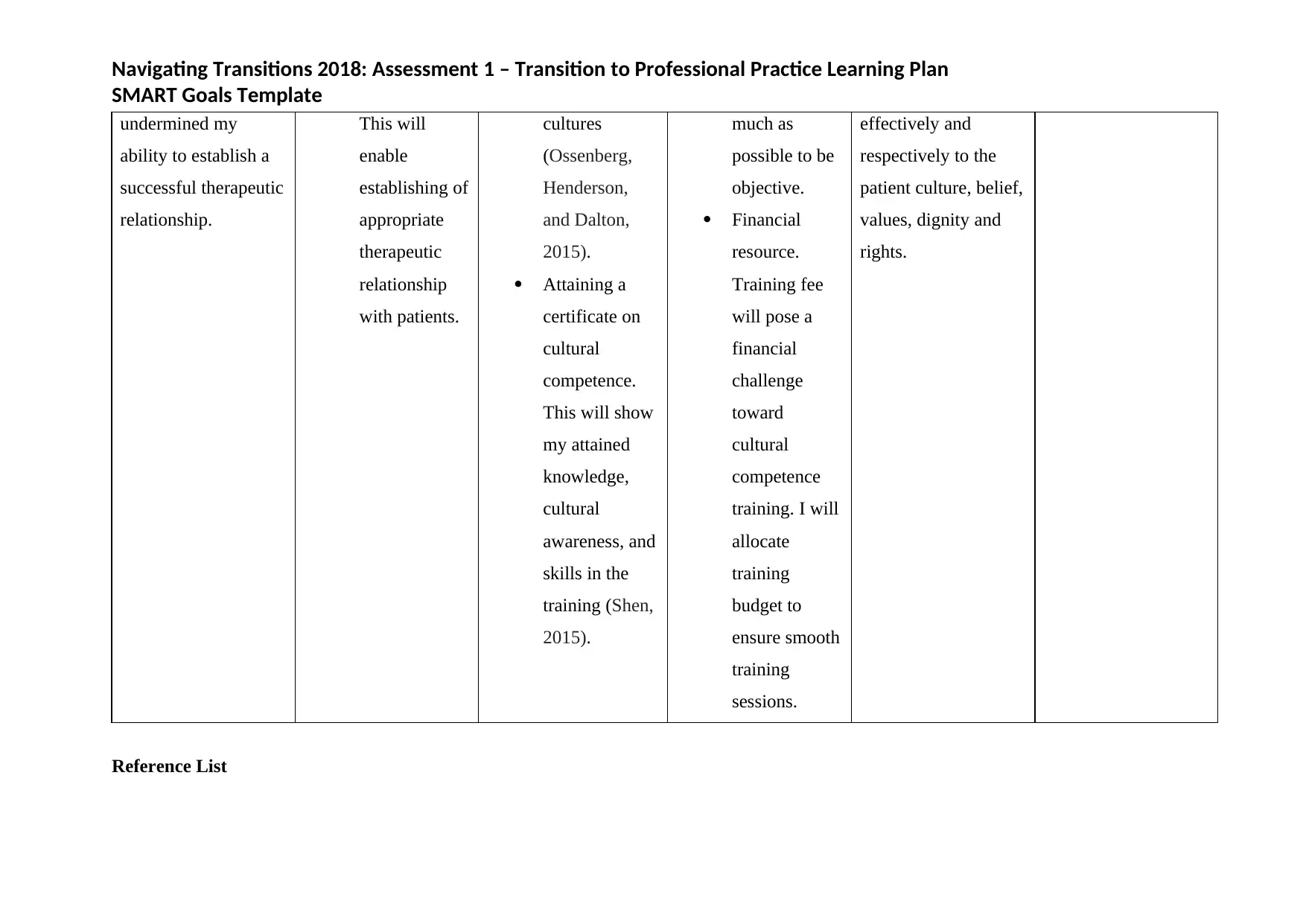
Navigating Transitions 2018: Assessment 1 – Transition to Professional Practice Learning Plan
SMART Goals Template
undermined my
ability to establish a
successful therapeutic
relationship.
This will
enable
establishing of
appropriate
therapeutic
relationship
with patients.
cultures
(Ossenberg,
Henderson,
and Dalton,
2015).
Attaining a
certificate on
cultural
competence.
This will show
my attained
knowledge,
cultural
awareness, and
skills in the
training (Shen,
2015).
much as
possible to be
objective.
Financial
resource.
Training fee
will pose a
financial
challenge
toward
cultural
competence
training. I will
allocate
training
budget to
ensure smooth
training
sessions.
effectively and
respectively to the
patient culture, belief,
values, dignity and
rights.
Reference List
SMART Goals Template
undermined my
ability to establish a
successful therapeutic
relationship.
This will
enable
establishing of
appropriate
therapeutic
relationship
with patients.
cultures
(Ossenberg,
Henderson,
and Dalton,
2015).
Attaining a
certificate on
cultural
competence.
This will show
my attained
knowledge,
cultural
awareness, and
skills in the
training (Shen,
2015).
much as
possible to be
objective.
Financial
resource.
Training fee
will pose a
financial
challenge
toward
cultural
competence
training. I will
allocate
training
budget to
ensure smooth
training
sessions.
effectively and
respectively to the
patient culture, belief,
values, dignity and
rights.
Reference List
Secure Best Marks with AI Grader
Need help grading? Try our AI Grader for instant feedback on your assignments.
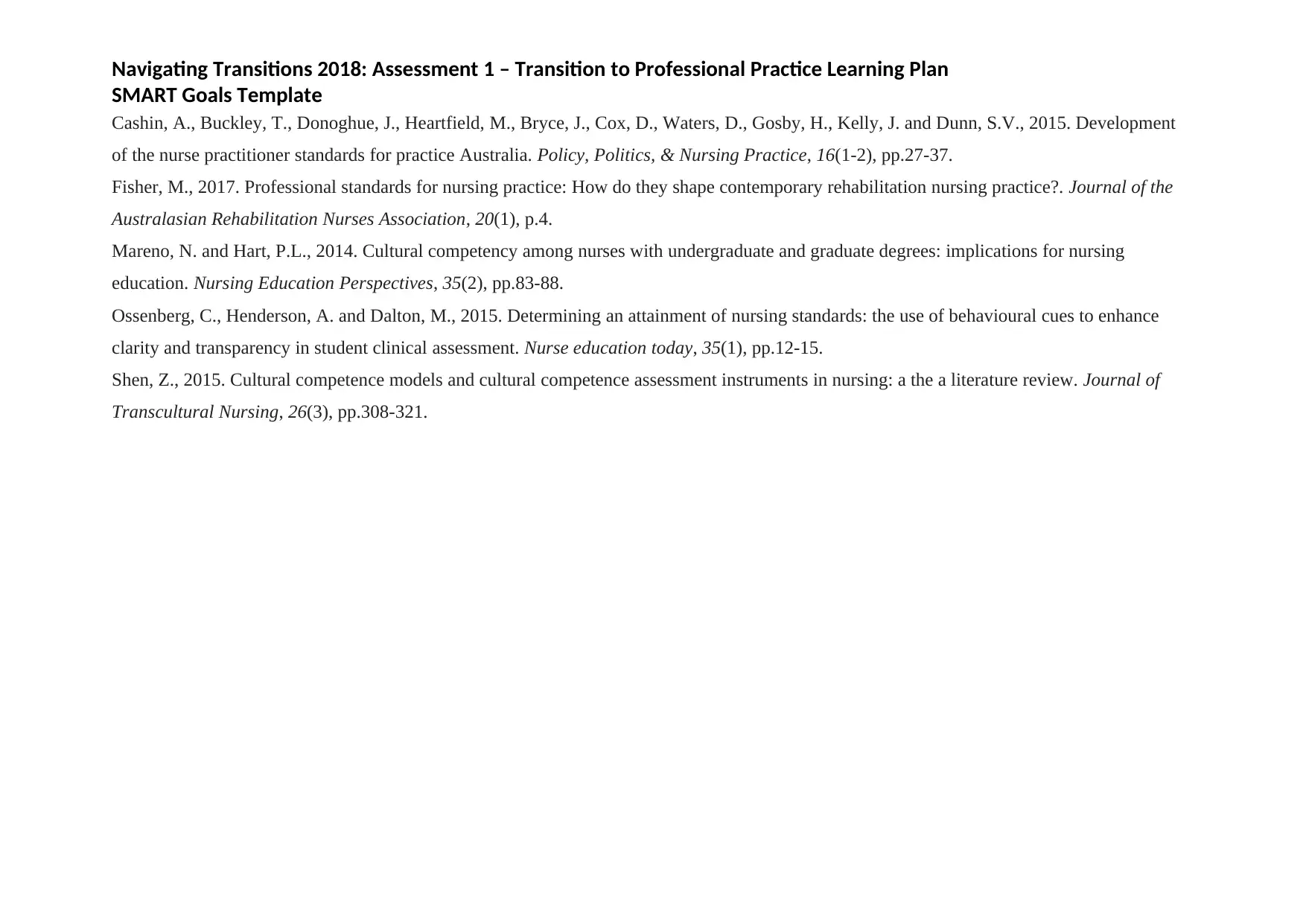
Navigating Transitions 2018: Assessment 1 – Transition to Professional Practice Learning Plan
SMART Goals Template
Cashin, A., Buckley, T., Donoghue, J., Heartfield, M., Bryce, J., Cox, D., Waters, D., Gosby, H., Kelly, J. and Dunn, S.V., 2015. Development
of the nurse practitioner standards for practice Australia. Policy, Politics, & Nursing Practice, 16(1-2), pp.27-37.
Fisher, M., 2017. Professional standards for nursing practice: How do they shape contemporary rehabilitation nursing practice?. Journal of the
Australasian Rehabilitation Nurses Association, 20(1), p.4.
Mareno, N. and Hart, P.L., 2014. Cultural competency among nurses with undergraduate and graduate degrees: implications for nursing
education. Nursing Education Perspectives, 35(2), pp.83-88.
Ossenberg, C., Henderson, A. and Dalton, M., 2015. Determining an attainment of nursing standards: the use of behavioural cues to enhance
clarity and transparency in student clinical assessment. Nurse education today, 35(1), pp.12-15.
Shen, Z., 2015. Cultural competence models and cultural competence assessment instruments in nursing: a the a literature review. Journal of
Transcultural Nursing, 26(3), pp.308-321.
SMART Goals Template
Cashin, A., Buckley, T., Donoghue, J., Heartfield, M., Bryce, J., Cox, D., Waters, D., Gosby, H., Kelly, J. and Dunn, S.V., 2015. Development
of the nurse practitioner standards for practice Australia. Policy, Politics, & Nursing Practice, 16(1-2), pp.27-37.
Fisher, M., 2017. Professional standards for nursing practice: How do they shape contemporary rehabilitation nursing practice?. Journal of the
Australasian Rehabilitation Nurses Association, 20(1), p.4.
Mareno, N. and Hart, P.L., 2014. Cultural competency among nurses with undergraduate and graduate degrees: implications for nursing
education. Nursing Education Perspectives, 35(2), pp.83-88.
Ossenberg, C., Henderson, A. and Dalton, M., 2015. Determining an attainment of nursing standards: the use of behavioural cues to enhance
clarity and transparency in student clinical assessment. Nurse education today, 35(1), pp.12-15.
Shen, Z., 2015. Cultural competence models and cultural competence assessment instruments in nursing: a the a literature review. Journal of
Transcultural Nursing, 26(3), pp.308-321.
1 out of 5
Related Documents
Your All-in-One AI-Powered Toolkit for Academic Success.
+13062052269
info@desklib.com
Available 24*7 on WhatsApp / Email
![[object Object]](/_next/static/media/star-bottom.7253800d.svg)
Unlock your academic potential
© 2024 | Zucol Services PVT LTD | All rights reserved.





